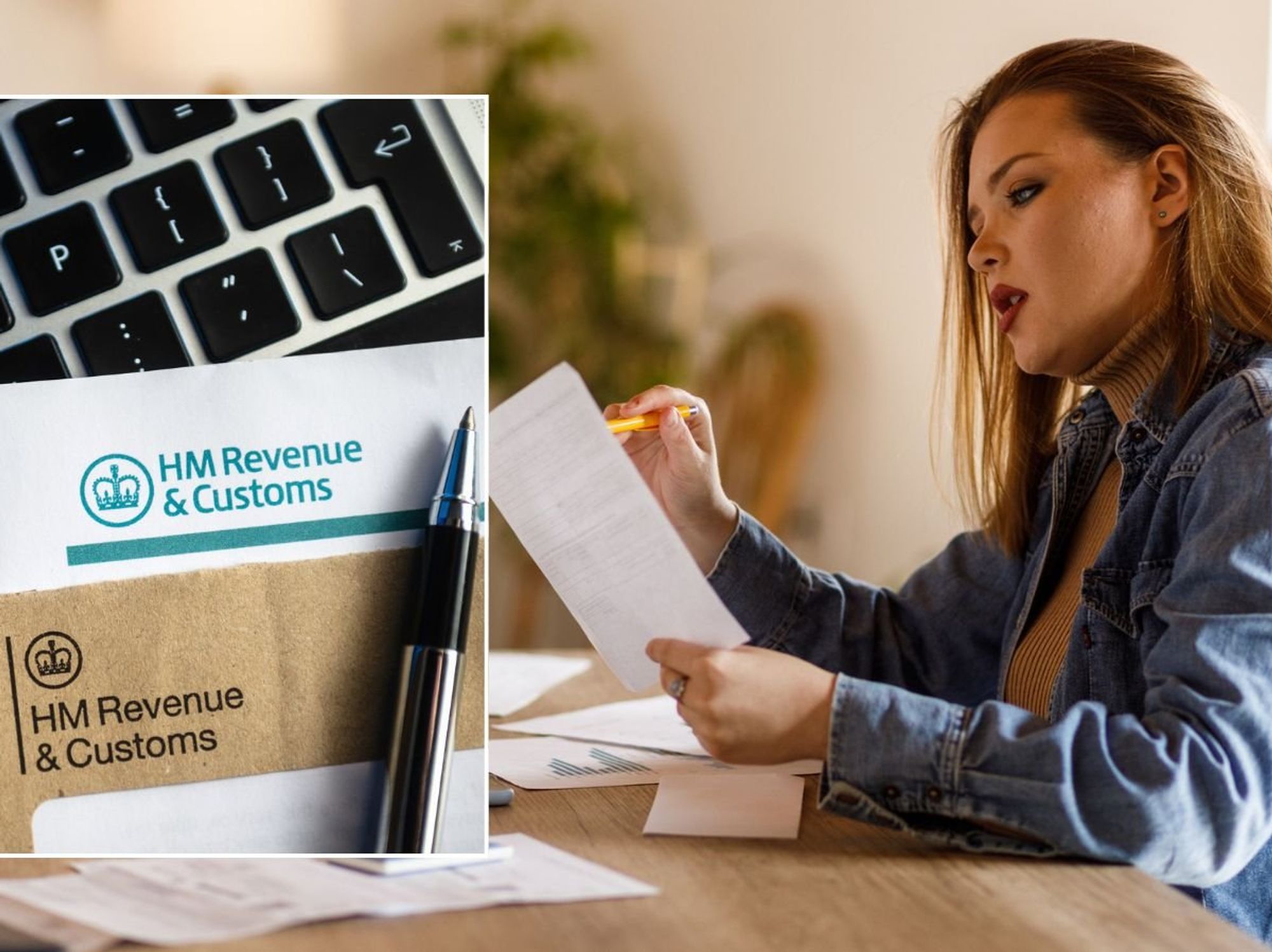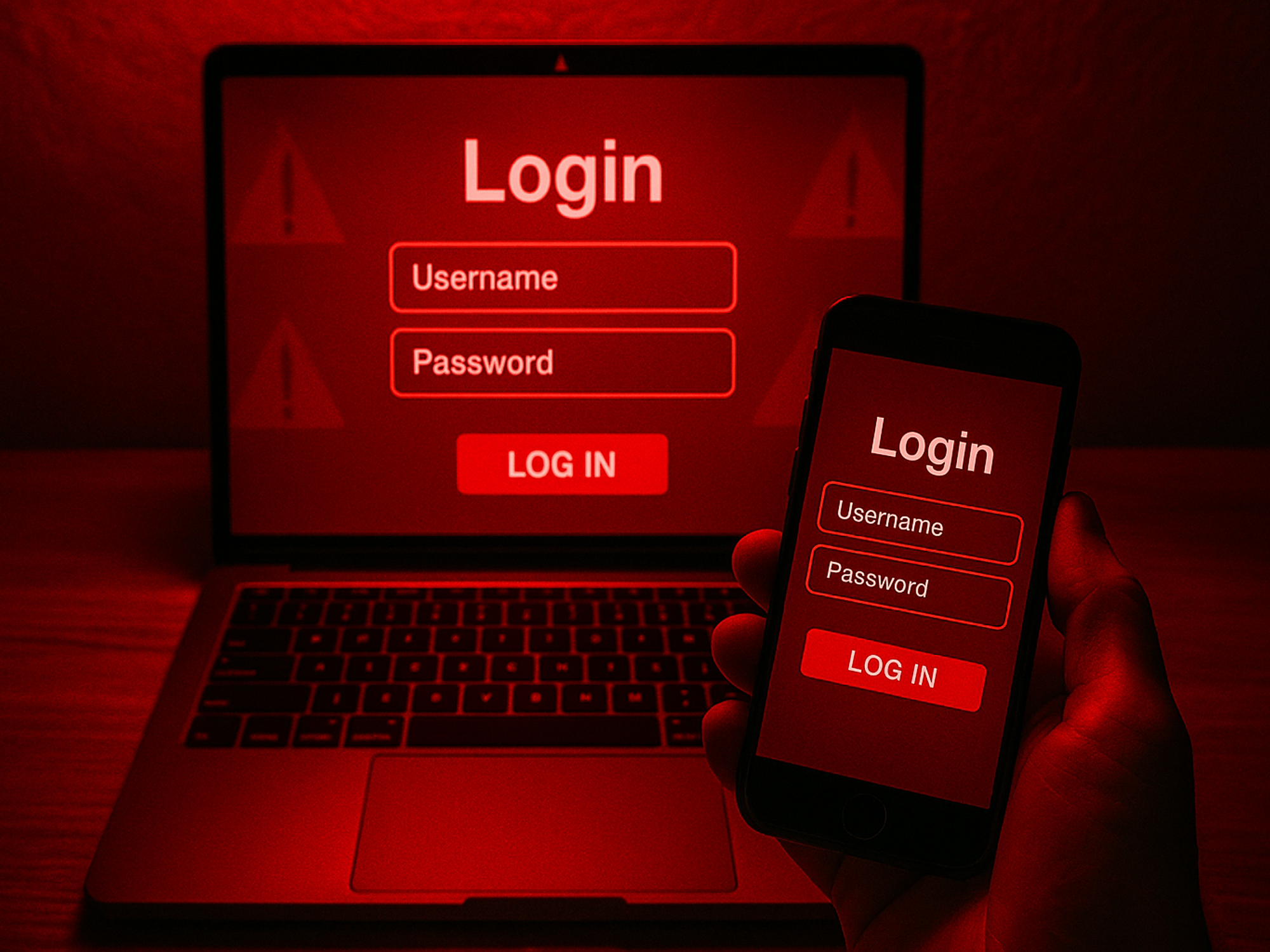With 8 million scams identified on Facebook and WhatsApp, new guidance issues to shield YOUR account
All products and promotions are independently selected by our experts. To help us provide free impartial advice, we will earn an affiliate commission if you buy something. Click here to learn more
Nearly 8 million accounts have been linked to scam centres
- Meta has identified nearly 8 million accounts linked to scam centres
- Platforms like Facebook and WhatsApp have been targeted by criminals
- Meta has partnered with social network analysis firm Graphika
- Together, these companies are uncovering emerging scam tactics
- Meta has warned about some of the things to watch out for
- WhatsApp and Facebook are testing new security protection features too
Don't Miss
Most Read
Latest
Staying safe online is harder than ever.
With billions of email addresses and passwords stolen and shared on the Dark Web, it's more important than ever to follow the best security practices. Since the beginning of the year, Meta alone has identified almost 8 million accounts linked to criminal scam centres targeting people around the world on its platforms.
Fraudsters are exploiting messaging apps, dating platforms, social media, crypto communities, and more — all with the same goals: to steal personal information, drain your finances, or trick you into revealing sensitive data.
Meta owns some of the most widely used apps on the planet, including WhatsApp and Instagram.
To strengthen protection across Facebook, WhatsApp, and other Meta platforms, the company has partnered with social network analysis firm Graphika to uncover emerging scam tactics and share best-practice guidance to help you stay secure. Follow the advice below — and change your password if it's on this list — and you've got a much better chance to outsmart the scammers.
GB News viewers get 4 months of ExpressVPN for FREE to protect their identity from hackers

Protect your money and your identity online. Block the scammers.
Get ExpressVPN right now. This award-winning VPN uses military-grade encryption to secure everything you do online across iPhone, Android, Linux, Windows, Mac, Fire TV, and dozens more.
GB News viewers can save up to 73% and unlock an extra 4 months free
ExpressVPN
$9.85
$2.65
On top of that, Meta is actively testing and introducing new safety features to keep users better protected. Here’s what you need to know — and how to safeguard yourself.

Online accounts and Facebook pages have been used to pose as customer service representatives for travel agencies, airlines, banks, and more
|PEXELS
Watch out for these scams
In Meta's partnership with Graphika, they've uncovered three scams that have repeatedly popped up across Facebook and other social media platforms.
For starters, fake home remodelling services and debt relief messages are being sent to users. Fraudsters have been able to achieve this by building websites that are designed to gather personal information needed to perform these services.
To target older users, they'll pretend to be providing government benefits to them when asking for this information.
Scammers have also created websites under the pretence of helping you recover funds, including crypto scams. Not only has this particular scam been found on Facebook, but it's also been seen on Instagram, Telegram, Threads, TikTok, YouTube, and X.
Finally, online accounts and Facebook pages have been used to pose as customer service representatives for travel agencies, airlines, banks, and more. Fraudsters can successfully trick users by commenting under official brands' posts to redirect them to DMs or Google Forms and get access to personal information.
LATEST DEVELOPMENTS
How to stay safe from common scams
Despite these increasingly sophisticated scams, there are three ways to actively protect yourself from falling victim to them.
- Stay cautious when receiving unsolicited messages or calls: Meta urges you to never share personal or financial information like your bank account numbers with those who are unexpectedly calling, emailing, or texting you. Companies and government agencies won't ask for this information unprompted
- Pause before taking action: Fraudsters commonly add a sense of urgency or panic to get you to take action before you have a chance to thoroughly think about what you're doing. If someone's pressuring you, it's best practice to check in with someone you trust before responding to them
- Only use official customer service channels: Instead of clicking on links in emails or texts, call the company's official hotline or head to their website for the official contact information. It's also best to avoid posting complaints on public forums because fraudsters will seek you out as a potential target
WhatsApp is launching warnings
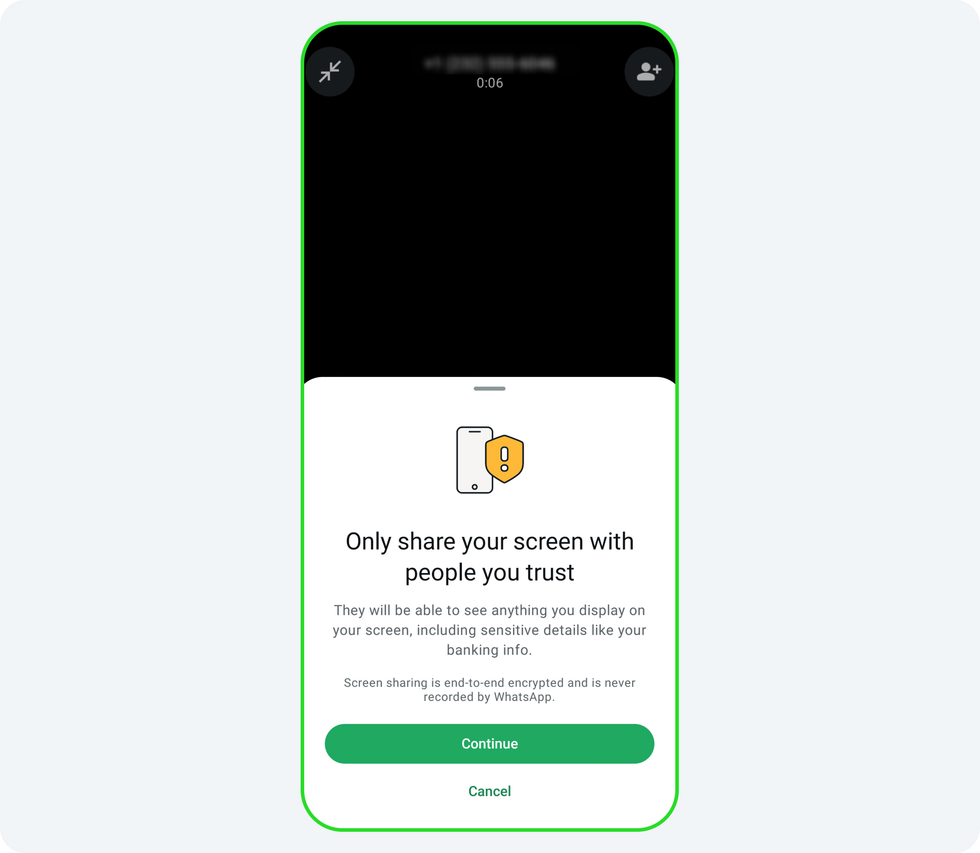
When you attempt to share your screen with an unknown contact on WhatsApp during a video call, a warning will pop up saying "Only share your screen with people you trust."
|META PRESS OFFICE
To combat these scams, Meta recently launched a warning feature on WhatsApp. When you attempt to share your screen with an unknown contact during a video call, a warning will pop up saying "Only share your screen with people you trust."
Scammers will often ask you to share your screen as a way to get you to share sensitive information. This warning from Meta has been put in place as an extra precaution in case you are actually on the phone with someone attempting to steal from you.
Messenger tests scam detection in chats
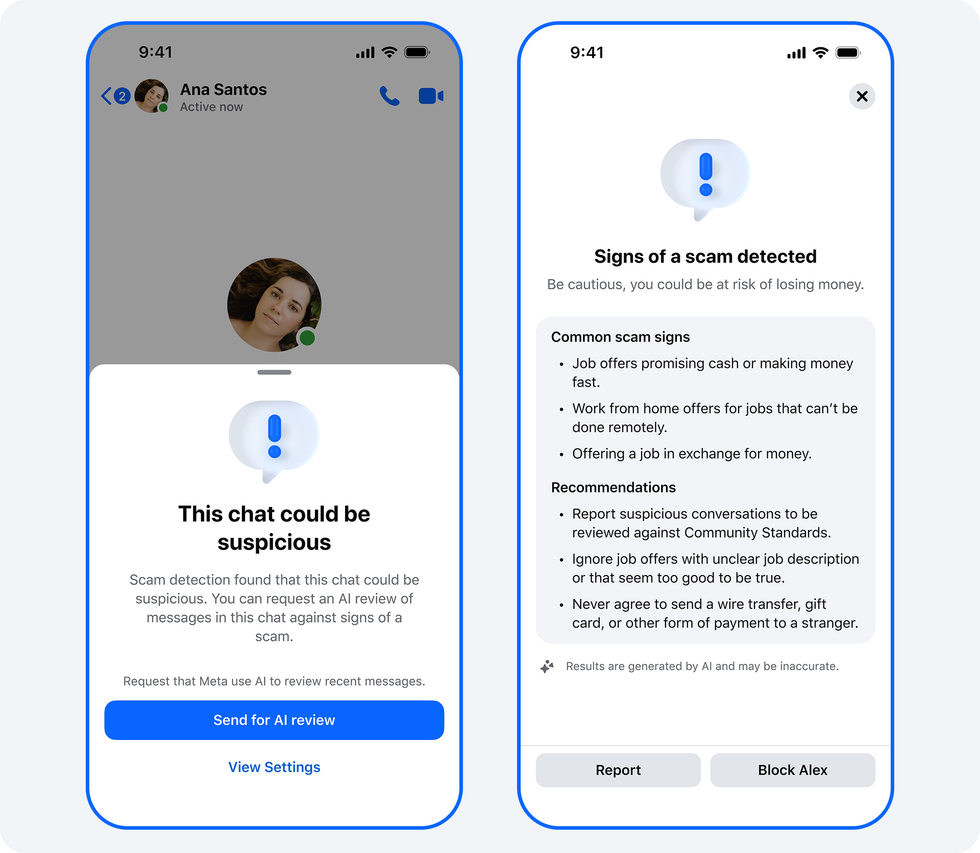
Meta is testing scam detection within your chats on Messenger
|META PRESS OFFICE
Similarly, Meta is also testing scam detection within your chats on Messenger. For instance, when a new contact sends you a message that could be potentially fraudulent, you'll have the option to send it in for a scam review. If a scam is detected, you'll then have the option to block or report the content.
Use Security Checkup on Facebook, Instagram, and WhatsApp
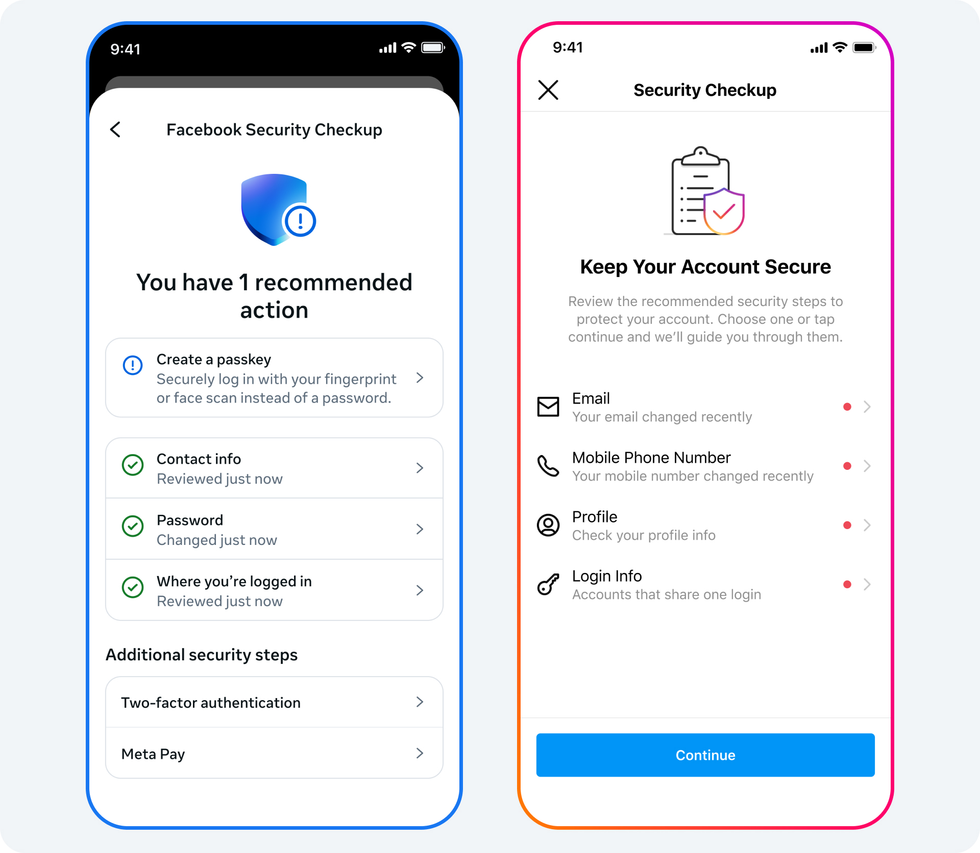
Security checks allows you to review your security settings and get recommendations on the best actions to take, like updating your password
|META PRESS OFFICE
Facebook and WhatsApp also have a feature called Security Checkup, which allows you to review your security settings and get recommendations on the best actions to take, like updating your password.
On the other hand, WhatsApp has Privacy Checkup. This guides you through important privacy settings, such as choosing the right protection method for yourself or deciding who you can add to groups.
More From GB News






